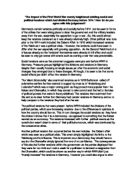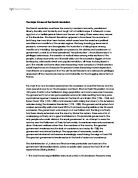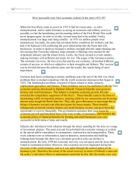Newspaper report - Power seized by Bolsheviks from the Provisional Government!
November 1917 Power seized by Bolsheviks from the Provisional Government! This picture shows the 21 members and 10 candidate members of the Central Committee at the time of the Revolution in 1917. In February 1917 the Bolshevik party was virtually unheard of and was small and irrelevant. As opposition rose for Tsar Nicholas II the Bolshevik party began to rise in status. In March 1917 the Tsar abdicated and Provisional Government controlled the running of Russia. This new Provisional Government were unwilling to withdraw Russian troops from World War One and on the 8th of July 1917 Lvov (A prince) resigned from the new Government and Alexander Kerensky was put in his place. Kerensky had previously been a member of the Duma and was popular with Russians. However, Kerensky, like Lvov, was unwilling to end the war. In fact, soon after taking office, he announced a new summer offensive as her still refused to end the War. Soldiers on the Eastern Front refused to go to the front line many men began to desert and soon many men had left the army. Economic and agricultural issues were also a growing problem in Russia as there were not enough men to run manual labour. People were literally starving due to this crisis. Some of these soldiers who returned to their homes used their weapons to seize land from the nobility. While all these problems were happening the Bolsheviks
Soviet historians hold the view that the period ranging from 1905 to 1914 was chosen by the Bolsheviks as a time to reorganis
Discuss the reasons why the Bolsheviks had achieved so little by 1914 Despite being the main opposition to the Tsar in Russia at the time, the Bolsheviks failed to make any significant progress in their aims to overthrow the Tsarist autocracy, due to many problems throwing the party in to crisis, with their efforts to influence the proletariat to revolt against the Tsar proved to be failed attempts. In order to come out with a fair and balanced conclusion, it is necessary to look at the opinions of historians from both ends of the spectrum: from the sympathetic Soviet historians, to the more critical opinions of the Western historians, and then lastly looking at the more balanced and neutral views of revisionist historians. Soviet historians hold the view that the period ranging from 1905 to 1914 was chosen by the Bolsheviks as a time to reorganise and strengthen their party, keeping in mind that the oppressive character of the Tsarist system caused too many obstacles for them, thus making it nearly impossible for them to make much progress in achieving there goals. Along with this, this body of historian also hold the Mensheviks responsible for lack of success, arguing that their awkwardness and co-operation with the bourgeoisie was undermining key Bolshevik beliefs, inadvertently destroying any opportunity the Bolsheviks may have had to create an alliance with the working
The League of Nations was a
First of all here is a little background on the League of Nations. The League of Nations came into being after the end of World War One. Their task was to ensure that war never broke out again. After the Treaty of Versailles, many looked to the League to help them and the world. The league of Nations were seen as a "loin with no teeth" as there looked very vicious and scary with countries such as Britain and France behind them but when push came to shove and other countries would not do what the league said then they couldn't do a thing. The league did have a few successes but mainly failures some of their successes were the treaty of Locarno and the Kellogg Briand Pact. Most of it failures happened during and because of Economic Depression such as Japans invasion of Manchuria. I will now go into detail on certain points of the Discussion. Representatives from big countries such as Britain, France, Germany and Italy signed the treaty of Locarno. It was designed to stop other countries in Europe from fighting or going to war again. Its main purpose though was to keep peace between Fance and Germany (But then in the 1930s this changed because of Hitler's coming to power!) Other successes were ones such as the Kellogg Briand Pact, this was signed by about 15 nations in 1928. This Pact was designed to disarm the countries and to stop any future wars. The League failed
To what extent does Chamberlain deserve the title of one of the Guilty Men?
Adrienne Stockley To what extent does Chamberlain deserve the title of one of the 'Guilty Men'? Chamberlain was in power between 1937-1940.Some people feel that Chamberlain was to blame for the second world while others disagree and feel that while he was in power he, in fact helped Britain. Chamberlain can be seen as deserving the title of 'the guilty men' because people believe that he gave into Hitler's demands too easily and that he was being fooled by Hitler. For example: in the Munich agreement, Chamberlain gave into Hitler's demands to keep peace. He appeared to believe Hitler's promise that he would not try and take over Czechoslovakia and although Czechoslovakia should have been involved greatly in the discussion, they were not even informed which of course made them angry. And, although some people feel that Chamberlain was simply fighting for time to rearm; many others feel that he was most definitely fooled by Hitler. Chamberlain was then, later made to look stupid when Hitler Invaded Czechoslovakia and took over Prague. People also felt that Chamberlain was stupid to sign the Munich agreement because of what Hitler wrote in his book 'Mein Kampf' where he said what his plans were. Some people felt that war was imminent because of Chamberlain's policy of appeasement. What Britain was
was bloody sunday the prime reason for the 1905 revolution
BLOODY SUNDAY WAS THE PRIME REASON FOR THE 1905 REVOLUTION? The events of Bloody Sunday were without a doubt an important part of Russian history as it exposed the spiralling problems the tsar faced, and the hurt of the people. The events of Blood Sunday only aided in aggravating the people and opposition as well as stimulating revolution. But yet on the other hand I still do not believe this was the prime cause for the 1905 revolutin. There are various reasons as to why bloody Sunday may have not been a prime reason for the 1905 revolution; for the reason that there are a range of long and short term causes for the march such as the ill treatment of workers and oppression through serfdom, the Russiffication of Russia that eventually led up to what was the bloody Sunday march, this brings to light the question whether the 1905 revolution would have occurred without the events of bloody Sunday. However the events of bloody Sunday helped to bring publicity to what was the worsening political and social situation in Russia in addition to tarring the image of Nicholas the II. So to a certain extent bloody Sunday did play a part in the 1905 revolution however I still do not believe bloody Sunday was the prime reason for the revolution. The government's incompetence and the lack of political reforms had a part to play in the build up to the revolution; by 1905 the Tsar's powers
How did the Bolsheviks consolidate their power: 1917 - 1924?
How did the Bolsheviks consolidate their power: 917 - 1924? " The remarkable feature about November 1917 is the way the Bolshevik leader, Lenin moved to the centre stage of Russian history, a position he maintained until his death in 1924".1 By the early 1920's Russia was in the authoritarian grip of a one party dictatorship. The Communist Party as the Bolshevik's had become. It had a ruthless leadership which was ideologically motivated to hold on to power at any cost. This was a dramatic change from the Bolshevik party's position in 1917 when the party enjoyed widespread support amongst the peasants, workers and soldiers who saw in the Bolshevik's the best hope for popular revolution. By the early 1920's however this had all changed. The Bolshevik's had lost the majority of its popular support after a ferocious Civil War and several economic disasters, political failures and mismanagement. Throughout the period 1917 to 1924 the Bolshevik's tried desperately to consolidate their power and regain control of the Country. Lenin had been in hiding in Finland since July 1917, and then on 23rd October 1917 he returned to Petrograd in disguise. He was convinced the time was right for the Bolshevik's to seize power, due to the civil unrest and disillusionment over the War. After hours of discussion Lenin finally won over, Zinoviev and Kamanev and all but 2 of the 12 man
Stalin's Rise to Power
Stalin's Rise to Power Power Struggle between Trotsky and Stalin and its Immediate Aftermath * The struggle for succession: Lenin finally died on January 1924, two years after a debilitating stroke in May 1992. Meanwhile various Party bosses began jockeying for his position. * Each of the major Party leaders had their own sources of power or fiefdoms. * Zinoviev headed the powerful and prestigious Party organisation of Petrograd * Kamenev headed the Moscow party organisation. * Trotsky remained Commissar for War and he had immense national prestige as a leader of the October Insurrection and organiser of the victory of the Civil War. However, he had joined the Bolsheviks only in 1917. * Bukharin was the editor of the Pravda, the Party newspaper. * Like Zinoviev and Kamenev, Stalin (born Djugashvili) was a long time Party member. From 1917 he was Commissar for Nationalities, and therefore responsible for the creation of the USSR in 1924. * Stalin was appointed as the General Secretary in 1922 May, and was a member of the Orgburo and Politburo since 1919. * Stalin had the political skills necessary to maximise the power the Secretariat gave him without overplaying his hand. Many regarded both Stalin and his official position as dull and insignificant - gave him a further advantage, because his rivals failed to take Stalin seriously until it was too late. Sukhanov
What were the causes of the russian revolution
What were the causes of the Russian Revolution? The Russian revolution was caused by the continual breakdown of the governments in Russia and the incompetency and authoritarian views of its Tzars. Their failures as leaders included policies that neither pleased nor benefited the people. By the end of the nineteenth century, Russia's economy, government, military, and social organization was at an extreme decline. Russia had become the least advanced of the major European nations in terms of political and social development. There was no parliament, and no middle class. The Church, officers, and other important people and institutions were firmly against social progress. For the first few decades of the 1800's, Russia's outlook was brighter under Alexander I, who was relatively liberal. He became more reactionary however, and following his death, a group of young army officers tried to overturn the Tzardom. This was called the Decembrist Revolt. The next Tzar, Nicholas, was a die hard authoritarian. The Administrative system continued to decay regardless of his iron fisted rule. The gap between the rich and the poorer continued to widen. Over five hundred peasant revolts took place during his reign. Alexander II, who took the throne in 1855 tried to avert revolt by attempting reform. In 1861 he freed the serfs and gave them expectations of free land allotments. But to their
How did Mussolini use the Arts and the Media as a way of controlling the Italian People?
How did Mussolini use the Arts and the Media as a way of controlling the Italian People? Mussolini had many methods of using people's own artistic talents to his own advantage, though the effectiveness of some of these methods is questionable. Mussolini used many different forms of media to communicate himself and his ideals. Perhaps the most effective of these was the use of the poster. A high proportion of Italy at this time was illiterate and the posters that were produced were attractive and portrayed 'Il duce' as a great man how had many interests and was grea at many things. the state constantly put up fresh posters for the regime, and also took down any anti-state posters. they were a great way of portraying in a glance how great Mussolini was supposed to have been. The newpapers and cinema were also used to try and control the thinking of the Italian people. However these two mediums of communication had difficulties as there was a high illiteracy rate and there was a general lack of enthusiasm for cinema going in Italy at that time. Only 10% of the population read Fascist run newspapers and most of the films on show at that time were from Holywood, so there was not the same oppotunity for Mussolini to exploit the cinema industry as Hitler had with his propaganda films such as 'The Eternal Jew'. Radio was the final method of mass media that Mussolini tried
"Why did Stalin, rather than Trotsky, emerge as Lenin's successor?"
"Why did Stalin, rather than Trotsky, emerge as Lenin's successor?" The triumph of Communism in Russia was arguably down to one man - Vladimir Ilyich Ulyanov (Lenin). The takeover started in April1917 when Lenin released the 'April Theses' asking for the provisional government to step down. It was 6 months later though that any real progress came about as Lenin and the Bolsheviks formatted a new Soviet Government. It did not go as smoothly as the Bolsheviks had planned though because as soon as they had set up a government - they had a civil war to deal with. This war heavily influenced their policies as they had to contend with fighting the Whites who were heavily against a Communist Russia. The party was hardened and militarized but this was through no choice of their own. Russia at this time saw the Bolsheviks instigate extreme economic policies such as War Communism and implacable hostility developed towards the West. The Civil war was not completely responsible for these effects but it is obvious that without the civil war - Communist Russia could have been a far different place. It was Lenin and his policies that helped the Bolsheviks consolidate power and for doing this, he was seen as an almost omnipotent figure by the Russian people. This was not the case for every Russian person however. On August 30th 1918 - Lenin survived an assassination attempt but he



























